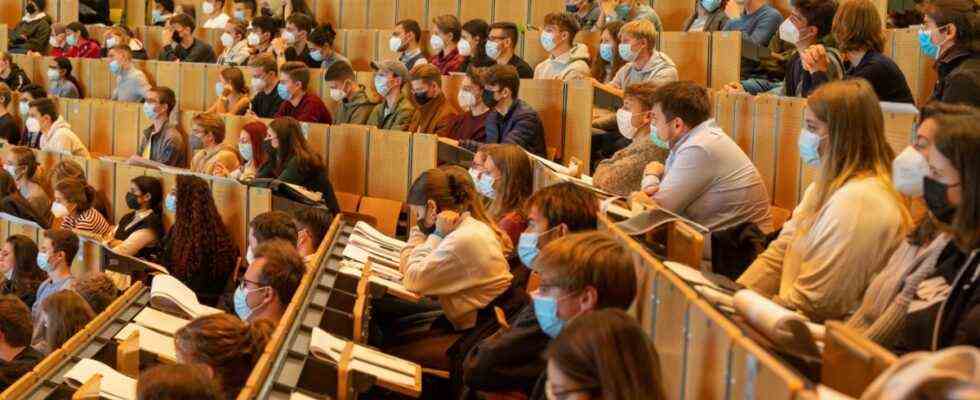The Corona traffic light is red. Where 3G was the rule before, 2G is now often the case. Not much has changed at the Munich colleges and universities – apart from a more stringent FFP2 mask requirement, the same regulation still applies here, i.e. 3G. The Technical University should therefore fill the Audimax with more than a thousand people, they would only have to wear a mask.
Such jam-packed events usually do not take place. Major courses such as business administration will mostly take place online this semester, so the Audimax will remain empty for the time being. However, after a year and a half, smaller courses started teaching face-to-face again in October. In the course of the rapidly increasing incidence values in Munich, more and more students there are also infected. The universities do not have any exact figures – only the health authorities say they have them – but if you ask around students, a worrying picture emerges.
At the Munich University of Applied Sciences, for example, seven entire courses, each with 20 to 30 people, had to go home in the past few weeks because someone in their ranks had become infected. This is what Petra Spier says, she is the corona officer at the university with lecture halls in Maxvorstadt and in Pasing. The number of unreported cases of infected students is much higher, because there is now no longer any obligation to report to the universities. Up until this semester there was still such a reporting requirement, but the state government has now abolished it. But because many students did not notice this, Petra Spier still receives a lot of positive reports. It encourages students to keep a so-called attendance diary in which contact persons, places and times are noted so that contact tracking can be regulated privately.
The only obligation to notify is currently to the health authorities, and they are so overwhelmed with the follow-up that the notifications are often too late. The student Lena also informed her contacts privately when she tested positive. Lena does not want to use her last name in this article because she does not want her corona disease to become public. In addition to tracking contacts, Lena also had to take care of her university material herself after her infection – since she hardly got to know fellow students through Corona, it was not necessarily easy. Half of your courses are online or hybrid – that is, in a mixed form – and the other half are only face-to-face. Due to the quarantine, she is now missing half of her events for two weeks. Some professors react courteously and put the materials online, but some lecturers then also literally say “it’s your own fault if you don’t come” and thus leave people in quarantine alone.
No uniform line at the universities
Such behavior is “completely unacceptable” and does not correspond to the line of the university, responded Corona officer Petra Spier. The university did everything to enable the teaching staff to offer a hybrid format: every lecturer was provided with a streaming set, training courses were offered and student assistants made available. It is a shame that some people do not rely on hybrid despite these possibilities, but in terms of freedom of teaching, the university cannot do much there, says Spier.
In contrast to Lena, many other course leaders are increasingly relying on online teaching. Master’s student Dayana, for example, hardly notices a difference in everyday university life due to her quarantine – her entire program has been online since the beginning of the semester. “Face-to-face teaching is being pushed back more and more,” she notes. In their opinion, this caution makes sense in view of the increasing number of cases.
When students do come to the universities, they are quite strict with the 3-G certificates, says a political science student at Ludwig Maximilians University – especially in contrast to clubs and restaurants, where visitors are sometimes simply waved through. On the other hand, university student Lena paints a different picture: She has not yet been checked once to see whether she can provide 3-G evidence. At the university and at the TU, the 3-G control is based on a random sample concept – Lena does not feel safe on campus as a result and demands stricter controls.

